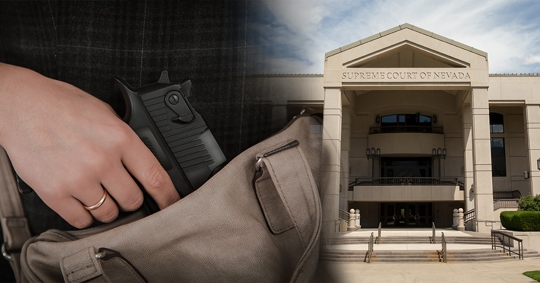Nevada is known for its gun-friendly culture, but that doesn’t mean firearm laws are simple or forgiving. Concealed carry in particular is governed by a strict set of rules, and even honest mistakes can lead to criminal charges.
Whether you’re applying for a concealed firearm permit or have already been charged with a violation, it’s important to understand what the law allows and where things often go wrong. Knowing your rights and obligations under Nevada law can help you avoid legal trouble or build a stronger defense if you’re already facing charges.
At Goodman Law Group, we represent clients across Las Vegas and Nevada in serious gun-related matters, including concealed carry offenses. The following guide outlines what gun owners need to know about concealed carry laws, permit eligibility, restricted locations, and the consequences of violations.
Who Can Legally Carry a Concealed Firearm in Nevada?
Nevada is a shall-issue state, meaning law enforcement (typically your county sheriff) must issue a concealed firearm permit (CFP) to applicants who meet all legal requirements. Permitless carry is not allowed, so anyone carrying a concealed firearm must have a valid permit.
To qualify for a Nevada CFP, you must:
- Be at least 21 years old (or 18 for active-duty military and certain veterans)
- Be a U.S. citizen or lawful permanent resident
- Complete a certified firearm safety course that includes live-fire qualification and instruction on Nevada firearm laws
- Have no felony convictions or violent misdemeanor convictions in the past 3 years
- Have no substance abuse issues, including DUIs within the last 5 years
- Not be a registered medical marijuana patient
- Not be subject to protective orders, restraining orders, or red flag orders
- Pass a background check, fingerprinting, and in-person application process
Both residents and non-residents are eligible to apply, though applications must be submitted in person. Permits are valid for five years and must be renewed through a similar process, including a refresher course.
Open Carry vs. Concealed Carry:
Open carry is legal in Nevada for anyone 18 or older who can legally possess a firearm. But concealed carry always requires a permit, including when carrying in a purse, backpack, or glovebox. Many violations occur when individuals don’t realize their method of carry is legally considered “concealed.”
Where Is Concealed Carry Allowed in Nevada?
If you have a valid Nevada concealed firearm permit, or a permit from a reciprocal state, you are allowed to carry in most public places. However, Nevada law outlines very specific locations where even licensed individuals cannot carry concealed.
Places you can carry with a valid permit:
- Your vehicle, as long as you are not under the influence of alcohol or drugs and the firearm is lawfully carried (i.e., properly concealed with a permit)
- Roadside rest areas
- State and national parks, forests, and wildlife management areas
- Bars and restaurants that serve alcohol, provided you’re not intoxicated and the location is not posted with signage prohibiting firearms
- Private property, unless the owner or operator prohibits firearms
Places off-limits even with a permit:
- K–12 school campuses, including parking lots
- Child care facilities
- College campuses and university buildings
- Secured areas of airports
- Public buildings with metal detectors or “no firearms” signage at entrances (e.g., libraries, some government offices)
- Courtrooms, jails, prisons, and detention facilities
- Certain federal areas, such as Hoover Dam and Red Rock National Conservation Area
Private property restrictions:
Businesses, especially hotels and casinos in Las Vegas, may prohibit firearms through internal policy. If you refuse to leave after being asked to disarm, you could be cited for trespassing.
Concealed Carry in Vehicles: Know the Rules
One of the most common sources of confusion involves firearms in vehicles.
- With a permit: You may carry a concealed firearm on your person or store it anywhere in your vehicle.
- Without a permit: The firearm must not be concealed on your person. It must either be:
- In plain view (e.g., on the passenger seat), or
- Concealed but not physically on you (e.g., in the glovebox or under the seat)
Although Nevada law preempts most local ordinances, some cities like North Las Vegas have stricter local laws that may still be enforced. Law enforcement confusion about these overlapping rules can sometimes lead to wrongful arrests.
Penalties for Violating Concealed Carry Laws
Nevada imposes serious penalties for violations of concealed carry laws. Even minor misunderstandings can result in criminal charges and long-term consequences.
Common offenses include:
- Carrying without a valid permit – Gross misdemeanor; up to 364 days in jail and a $2,000 fine
- Possession in a prohibited area – Misdemeanor or felony, depending on the location and circumstances
- Carrying while under the influence – Misdemeanor under NRS § 202.257; may lead to jail time, fines, and permit revocation
Even a first-time offense can result in permanent loss of your firearm rights and a criminal record that affects your employment, licensing, and future opportunities.
Why You Need an Experienced Attorney for Gun Charges
Even law-abiding gun owners can find themselves in legal trouble due to the complexities of Nevada’s firearm laws. If you're charged with a concealed carry violation, the attorney you choose can make a significant difference in your case outcome.
Attorney Ross Goodman is a Board Certified Criminal Trial Specialist by the National Board of Trial Advocacy and one of the few lawyers in Nevada recognized in the USCCA Attorney Network. With nearly 30 years of experience, he is known for handling high-profile, high-stakes cases with precision and discretion.
If you've been arrested or cited for a concealed carry crime or any weapons offense, don’t wait. You have rights and you deserve an attorney who can enforce them. Call (702) 825-7854 or contact us online to request a FREE consultation.

